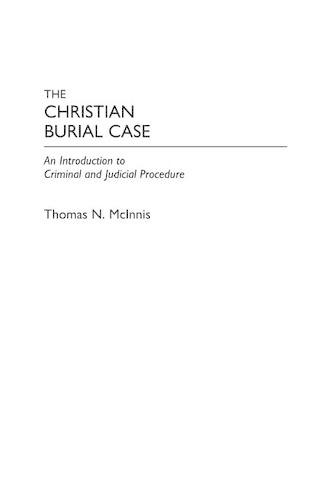
The Christian Burial Case: An Introduction to Criminal and Judicial Procedure
(Paperback)
Available Formats
Publishing Details
The Christian Burial Case: An Introduction to Criminal and Judicial Procedure
By (Author) Thomas McInnis
Bloomsbury Publishing PLC
Praeger Publishers Inc
30th October 2000
United States
Classifications
General
Non Fiction
Criminal law: procedure and offences
Constitutional and administrative law: general
Crime and criminology
345.7305
Physical Properties
Paperback
256
Width 156mm, Height 235mm
397g
Description
On December 24, 1968, ten-year-old Pamela Powers was brutally murdered, her body dumped at the side of the road to freeze. Robert Anthony Williams was charged with the crime, and a series of trials, appeals, and reversals ensued. The Christian Burial Case: An Introduction to Criminal and Judicial Procedure introduces readers to the intricacies of the American legal system, using the Williams case to illustrate all the stages of the legal process from the point of arrest, to the trial, the appellate process, and, ultimately, the Supreme Court. The text clearly and concisely explains criminal and court procedures in the context of the Williams case, paying careful attention to the rights against self-incrimination and to counsel, and to the role of the exclusionary rule in our system of justice. This unique introduction to criminal justice and judicial procedure captures the imagination of the reader as it chronicles The Christian Burial case from beginning to end. Because the suspect was observed leaving the scene of the crime with the body of the victim, the Williams case seemed to be open and shut. But due to police procedures in apprehending and questioning the suspect, the resolution of the case took fifteen years and two United States Supreme Court decisions. By highlighting the difficulties of determining the facts of the case and the proper procedural laws that were applicable, McInnis demonstrates the complexities inherent in the legal system. This compelling book is a must-read for all people interested in learning more about criminal procedure and judicial processes.
Reviews
"This is an unusual textbook in that it is a major, original research project itself. Professor McInnis thoroughly covers the criminal justice process without putting the reader to sleep. His detailed discussion of the factual disputes at the murder trials gives readers a realistic view of the difficulty in determining facts. The author draws on a large number of resources to study the Williams case from the criminal act to the impact of the decision."-Jeddy LeVar Professor of Political Science Henderson State University
Author Bio
THOMAS N. MCINNIS is an Associate Professor at the University of Central Arkansas where he teaches courses in judicial systems, constitutional law, civil liberties, and American government./e He has published numerous articles.
